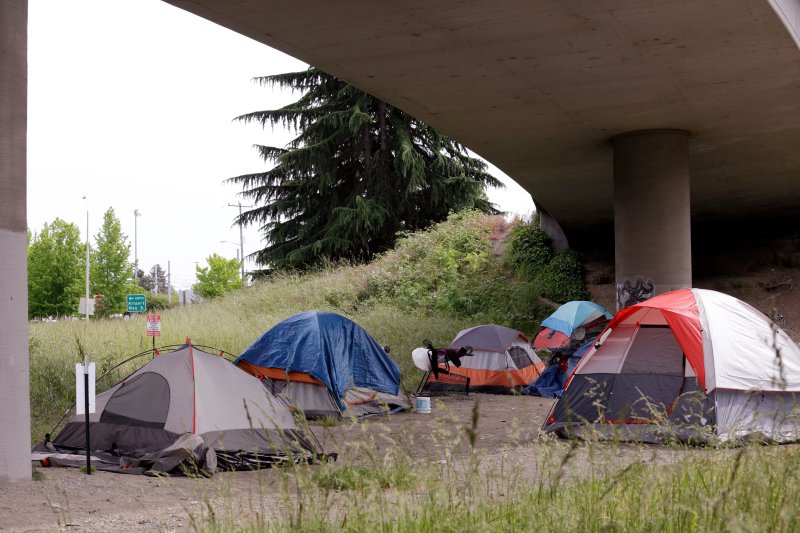The local Portland area publication The Willamette Week
has been following developments surrounding a bond measure passed last year
that will fund services for houseless individuals in the tri-county Portland region.
Since then, there has been much contention between the joint offices tasked with drafting plans on what types of
services to provide and how to spend the money. The current proposal places focus
on establishing safe resting villages that would provide space for tent and car
camping, along with hygiene and case management services. One commentary piece titled, “Why Not Use Homeless Funds to Pay Portlandersto Move Out of Oregon” addresses a fascinating point: "It’s probably a measure of America’s
ambivalence about the welfare state that making poor people less poor by giving
them money—money you’ve already set aside to fight poverty—is seen as a
radical, bordering on insane idea.”
 |
|
That article references a recent study conducted in
Vancouver, B.C. called the New Leaf Project, conducted by the Foundations for Social Change. The
study distributed one-time payments of $7,500 to 50 houseless individuals in
the area with no conditions on spending. A control group of 65 individuals who
did not receive payments was also established, and both the cash recipients and
control group were given access to workshops and life skills trainings. According
to the study’s results summary, the cash recipients had improved chances of
finding and maintaining stable housing, improved food security, and much of the
spending was focused on “recurring staples like housing/rent, food,
transportation, and utility bills.” The results also note a 39% reduction in
spending on alcohol and drugs, which is an important highlight when a common
argument against giving low-income people money is that they will spend it unwisely.
Although not directly related to houselessness, another
study titled the Stockton Economic Empowerment Demonstration (SEED) revealed similar trends in the spending of low-income individuals. In
this study, 125 Stockton, CA residents were given an unconditional $500 payment
every month for 24 months. The results of the study’s first year have been
released, and once again much of the money is shown to have gone toward food security, and the
study even identified a “spillover” effect in which households having to rely on
others for money or food could now instead become relied upon themselves.
Advocates for direct cash transfers take care to stress that
there is no simple one-point approach to ending houselessness or poverty. The conclusion of the
SEED results summary suggests that:
“Additional policies to implement alongside a guaranteed
income include: protection against predatory financial actors and instruments
like caps on adjustable interest, second-chance banking, third-party targeting
of financially vulnerable populations, and exorbitant fines and fees from the
criminal justice system; address the unique barriers that women face in the
market through paid family leave and universal child care; ⁶The most recent
RCTs of guaranteed income conducted in the US were the Negative Income Tax Experiments,
which concluded in 1982. stocktondemonstration.org mitigating the cost of
housing through rental assistance, tenant protections, and increased supply of
housing; and ensure that labor is fairly compensated through a higher minimum
wage. All polices should help build an economy that works for everyone, and is
rooted in equity for traditionally marginalized populations.”
In an interview with Vox
relating to the New Leaf Project, Doctor Gary Bloch (who “prescribes money to
low-income patients”) stresses that, “the solution to homelessness is housing…especially
in a city like Vancouver where housing supply is low and rents are
astronomical, it will be very hard to sustain a homelessness intervention
without offering long-term affordable housing.” Still, the short-term benefits
of providing houseless and low-income individuals with unconditional cash, such
as becoming more food and housing-secure, should not be understated. Further, these types of
studies should help break the dangerous stigma surrounding those who are houseless
or living in poverty as individuals with poor morals, when they are simply individuals
in need of assistance.
Like author Marty Smith stated in his Willamette Week piece,
dedicating all the funds to direct payments is unlikely to yield entirely successful
results, but perhaps the idea of giving people exactly what they need directly,
as opposed to through services and institutions, shouldn’t be entirely
discarded either.
Sources and Further Reading:
https://forsocialchange.org/new-leaf-project-overview
https://www.givedirectly.org/research-on-cash-transfers/
https://rooseveltinstitute.org/wp-content/uploads/2020/07/RI-No-Strings-Attached-201705.pdf
https://www.stocktondemonstration.org/
https://www.vox.com/future-perfect/21528569/homeless-poverty-cash-transfer-canada-new-leaf-project










